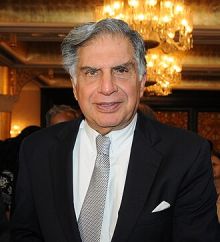Ratan Tata
From Knowlepedia, the free encyclopedia
| Born | 28 December 1937 |
| Birth place | Bombay, Bombay Presidency, British India (now Mumbai, Maharashtra, India) |
| Nationality | Indian |
| Education | B.Arch, Cornell University Advanced Management Program, Harvard Business School |
| Occupation | Industrialist, Philanthropist |
| Known for | Former Chairman of Tata Sons, Tata Trusts, Philanthropy, Ethical Leadership |
| Website | [Tata Group Official website] |
Ratan Naval Tata (born 28 December 1937) is an Indian industrialist, philanthropist, and former chairman of Tata Sons, the holding company of the Tata Group, India’s largest conglomerate.[1] Under his leadership, the Tata Group expanded globally and introduced iconic products like the Tata Nano car and Tata Indica.[2] He is widely respected for his ethical business practices and philanthropy.[3]
Early Life and Education
Ratan Tata was born in Bombay (now Mumbai), India, into the prominent Tata family.[4] He is the great-grandson of Jamsetji Tata, founder of the Tata Group. He attended the Cathedral and John Connon School in Mumbai and graduated with a degree in architecture from Cornell University in 1962.[5] Later, he completed the Advanced Management Program at Harvard Business School in 1975.[6]
Career
Ratan Tata began his career in the Tata Group working on the shop floor of Tata Steel.[7] Over the years, he held various roles across different Tata companies, gaining a deep understanding of the business.
In 1991, he was appointed chairman of Tata Industries and in 1999 became chairman of Tata Sons.[8] During his tenure, the group expanded internationally with acquisitions like Tetley Tea, Jaguar Land Rover, and Corus Steel.[9] He also spearheaded the development of the Tata Nano, an affordable compact car designed for the Indian market.[10]
Ratan Tata stepped down as chairman in 2012 but remains chairman emeritus of Tata Sons and continues to influence the conglomerate's philanthropic initiatives.[11]
Philanthropy
Ratan Tata is known for his generous philanthropic work through the Tata Trusts, which focus on healthcare, education, rural development, and arts.[12] He has also supported numerous charitable causes personally and promoted ethical leadership in Indian industry.[13]
Awards and Recognition
- Padma Bhushan (2000), one of India’s highest civilian awards.[14]
- Padma Vibhushan (2008), the second-highest civilian award.[15]
- Honorary Knight Commander of the Order of the British Empire (KBE) (2009).[16]
- Carnegie Medal of Philanthropy (2015).[17]
- Included in Time magazine’s list of the 100 most influential people in the world.[18]
References
- ↑ https://www.tata.com
- ↑ https://www.forbes.com/profile/ratan-tata/
- ↑ https://www.bbc.com/news/world-asia-india-24473491
- ↑ https://www.bbc.com/news/world-asia-india-24473491
- ↑ https://www.forbes.com/profile/ratan-tata/
- ↑ https://www.forbes.com/profile/ratan-tata/
- ↑ https://www.bbc.com/news/world-asia-india-24473491
- ↑ https://www.forbes.com/profile/ratan-tata/
- ↑ https://www.tata.com
- ↑ https://www.forbes.com/profile/ratan-tata/
- ↑ https://www.bbc.com/news/world-asia-india-24473491
- ↑ https://www.tata.com
- ↑ https://www.bbc.com/news/world-asia-india-24473491
- ↑ https://www.forbes.com/profile/ratan-tata/
- ↑ https://www.forbes.com/profile/ratan-tata/
- ↑ https://www.bbc.com/news/world-asia-india-24473491
- ↑ https://www.bbc.com/news/world-asia-india-24473491
- ↑ https://www.forbes.com/profile/ratan-tata/

